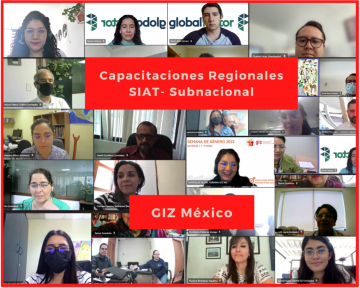This March, more than 80 officials from Mexico’s states responded to the Ministry of the Environment and Natural Resources (SEMARNAT) call and were trained in the use and promotion of the Subnational Climate Action Monitoring System (SIAT-Subnational).
The system was built with the support of the Deutsche Gesellschaft für Internationale Zusammenarbeit (GIZ Mexico) GmbH, and its objective is to measure, report and evaluate government climate action efforts implemented in the country, both adaptation to climate change and mitigation of greenhouse gases (GHG). By tracking the efforts on the matter, each official will be able to contribute and access the subnational governments’ technical knowledge regarding climate action.

Through the SIAT-Subnational, climate and environmental policy tasks throughout the country will benefit from an updated, and dynamic repository of the subnational administrations contributions to national and international objectives to address the climate crisis. Likewise, it leads to the establishment of a cost-effectiveness reference framework that enables the entire Federation to qualify, modify and replicate the different policies implemented.
At the subnational level, the system facilitates the creation of a good practices network for common problems, encouraging key actors to share their innovations, improve their implementation processes and nurture methodologically standardised learning throughout the country.
Finally, the training and use of the system are also part of a significant victory for citizens, who now have access to an updated, robust, methodologically uniform, and official tool to monitor public actions that seeks to transcend administrations.
All of these makes the training a milestone in the construction of comprehensive instruments aimed at achieving the climate, environmental and social commitments adopted both within the country through all levels of government, as well as with the international community and future generations.
